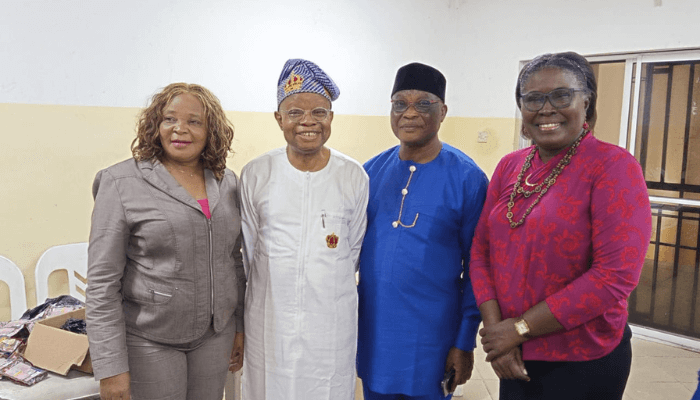Weak research, poor manufacturing undermine Nigeria’s health security, experts warn
Leading experts in the health sector have warned that Nigeria’s dependence on imported medicines, weak research capacity, and poor local manufacturing infrastructure continue to undermine the country’s health security and capacity to respond to emerging health threats.
This is even as they have called for urgent investment in research, local drug production, and stronger multi-sector collaboration to protect public health and achieve self-reliance.
Professor John Oladapo Obafunwa, the director-general of the Nigerian Institute of Medical Research (NIMR), at the 2025 Annual Conference of the Health Writers Association of Nigeria (HEWAN) in Lagos, said the country stands at a defining moment where the quality and credibility of scientific and health systems will determine the nation’s resilience against both infectious and non-communicable diseases.
Read also: Lagos bets on digital radio, telemedicine to deepen health insurance enrollment
Obafunwa, who was represented by Prof. Oliver Ezechi, director of research at NIMR, described the conference as a timely platform to elevate the quality, integrity, and public value of science and health collaboration in Nigeria, stressing that progress in healthcare cannot occur without strong research foundations and reliable local manufacturing.
“We live in an era of rapid scientific advancement and expanding health knowledge, yet our systems remain challenged by weak research funding and dependence on imported solutions. Leadership in health and science is a collective responsibility that requires trust, sustained collaboration, and data-driven action,” he said.
Obafunwa noted that improving Nigeria’s health security will depend on building multidisciplinary partnerships among research institutions, policy agencies, and private sector actors, while assuring that the NIMR remains committed to fostering such partnerships to bridge the gap between scientific discovery, policy development, and community health practice.
“Our agenda must focus on strengthening data literacy, advancing ethics, and creating a culture of collaboration that can translate research findings into actionable health outcomes,” he added.
Echoing this concern, Prof. Lere Baale, president and chairman of Council of the Nigeria Academy of Pharmacy, said that no nation can claim to be truly healthy or secure if it cannot produce its own essential medicines.
Delivering his presentation titled “Drug Research and Development: From Laboratory to the Patient,” Baale emphasised that a weak research base and poor local manufacturing capacity leave Nigeria vulnerable to external shocks and medicine shortages. “A country that cannot produce its own essential medicines remains vulnerable to external shocks and shortages. Medicine security is a national security imperative,” he warned.
Read also: Weak systems trap Nigerians life expectancy behind peers despite health reforms
He outlined six critical phases of the drug research and development process: discovery, preclinical and clinical testing, regulatory review, manufacturing, and patient access — noting that each stage requires local expertise, strong regulation, and government support.
Baale called for the establishment of African Centres of Clinical Excellence, led by the Nigeria Academy of Pharmacy, the National Institute for Pharmaceutical Research and Development (NIPRD), and top universities. These centres, he said, would ensure that Africa’s unique disease patterns and genetic diversity are better represented in global medical research.
According to him, local investment in drug research and production will not only improve access to affordable medicines but also stimulate economic growth, create jobs, and reduce overdependence on imports. “The journey from the laboratory to the patient is a sacred partnership between science and humanity, discovery and delivery. Innovation must always serve people, not profit alone,” Baale said.
He urged policymakers and industry leaders to prioritise health research in the national budget, strengthen regulatory harmonisation through the African Medicines Agency (AMA) and equip young scientists with the tools to innovate locally.
Pharm. Gilbert Ogbewele, marketing and business support lead, Roche Nigeria, who represented Dr. Ladi Hameed, the general manager, at the conference, affirmed that Roche is proud to partner with HEWAN, a truly critical stakeholder entrusted with preserving public interest.
“Your role in educating the Nigerian public about the scourge of breast cancer is invaluable. Crucially, you offer hope by arming our citizens with information about the available policies and breast cancer care initiatives that are functional in Nigeria today,” Ogbewele stated.
Read also: NMA applauds Uba Sani over health sector reforms in Kaduna
The conference aims to leverage the media’s reach to drive increased awareness, encourage early detection, and support the strengthening of Nigeria’s healthcare system for improved cancer care and survival.
Ogbewele also noted that journalists are critical in supporting the government’s drive toward universal health coverage.
This initiative is part of Roche’s bold Africa Breast Cancer Ambition (ABCA), a mission dedicated to rewriting the story of breast cancer in Nigeria. Roche invited the media to join the quest to make a real difference in the essential fight against breast cancer.
Across all sessions, participants agreed that Nigeria’s health future depends on how effectively government, academia, industry, and the media can work together to make science relevant, accessible, and actionable.

